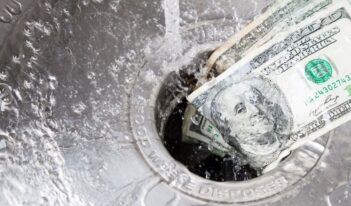
The SEC approves bitcoin ETFs, EPA prohibits the manufacture of certain PFAS, and more…
IN THE NEWS
- The U.S. Securities and Exchange Commission (SEC) approved bitcoin exchange-traded funds (ETFs), allowing investors to buy and sell bitcoin just like stocks and other financial instruments. Prior to this approval, investors were required to trade bitcoin on crypto exchanges and incur large fees. The SEC rejected applications for these bitcoin ETFs before, stating that the underlying market was too vulnerable to fraud and market manipulation. Now, the SEC approved all 11 applications filed by asset managers. SEC Chair Gary Gensler said, despite this action, the SEC does not “approve or endorse bitcoin” or “crypto trading platforms or intermediaries.”
- The U.S. Environmental Protection Agency (EPA) finalized a rule restricting the manufacturing and processing of 329 per- and poly-fluoroalkyl substances (PFAS). PFAS are long-lasting chemicals associated with adverse health and environmental effects, including an increased risk of some cancers and the contamination of drinking water sources. Under the rule, covered companies that intend to use PFAS for new uses must notify EPA. To approve the new uses, EPA must conduct a detailed review, evaluating the potential risks associated with the proposed use and implementation of restrictions.
- The European Parliament announced a rule that all portable electronic devices sold in the European Union must have a USB Type-C charging port by the end of 2024. The new rule aims to increase efficiency for consumers by establishing that consumers need only one kind of charger and ensuring consistent charging speeds across devices. The European Parliament predicted that the rule would benefit the environment, noting that 11,000 tons of chargers become e-waste each year.
- The Federal Communications Commission (FCC) proceeded with a proposed rule that would prohibit cable operators and satellite service providers from charging early termination and billing cycle fees. The FCC approved this proposal at an open commission meeting in December 2023. The ban was proposed by President Joe Biden in November 2023. At the December meeting, FCC Chair Jessica Rosenworcel referred to these “junk fees” as “aggravating and unfair.”
- The U.S. Department of Labor issued a final rule for classifying workers as employees or independent contractors. The rule adopts a new standard, taking into account factors such as the degree of control companies exercise over workers and whether the work performed is an integral part of a company’s business. Acting Secretary of Labor Julie Su said the rule will “help create a level playing field for businesses” and “affirm the vital role true independent contractors play in our economy.” The new rule reverses a Trump Administration rule that made it easier for employers to classify workers as independent contractors.
- The National Highway Traffic Safety Administration proposed a rule that would gather the data needed for a standard requiring that new vehicles be equipped with drunk and impaired driving prevention technology. Under the Bipartisan Infrastructure Law, the U.S. Congress directed the agency to establish a final rule by 2024. The mandated impaired driving prevention technology must monitor driver performance to assess impairment, measure blood alcohol concentration, or both, and must limit operation of the vehicle if impairment is found.
- The Internal Revenue Service announced a three-day extension of its time-of-sale reporting deadline for clean vehicle dealers and sellers. For the buyer of a clean vehicle to receive a tax credit, dealers and sellers must report the sale of a clean vehicle to the IRS through the Energy Credits Online platform. Under the extension, dealers and sellers have until January 19 to submit time-of-sale reports for vehicles sold between January 1 and January 16.
- The U.S. Fish and Wildlife Service issued a notice that the agency will begin a five-year review of five northeastern species under the Endangered Species Act. The endangered and threatened species to be examined include the clubshell, the northern riffleshell, the Chittenango ovate amber snail, the Knieskern’s beaked-rush, and the Puritan tiger beetle. According to the Endangered Species Act, the agency must complete this species status assessment to ensure the accuracy of the Lists of Endangered and Threatened Wildlife and Plants.
WHAT WE’RE READING THIS WEEK
- In a public comment published by the Regulatory Studies Center at the George Washington University, visiting scholar Mary Sullivan discussed the proposed rule from the Federal Trade Commission (FTC) banning unfair and deceptive fees. Sullivan argued that the economy-wide scope of the rule is “naive” and it may be impossible for the FTC to enforce. Sullivan also contended that even though the FTC refers to a specific set of practices used by hotel and live event ticketing businesses, the proposed rule would go far beyond this specific area and ban unharmful fees. Sullivan proposed that the FTC make it more enforceable by limiting its scope to hotels and live event ticketing businesses whose fees, in Sullivan’s view, actually harm consumers.
- In an article in the Belmont Law Review, Nora Klein, a law student at the Belmont University College of Law, argued for increased regulation of pharmaceutical advertising by telemedicine companies on social media. Klein observed that direct-to-consumer telemedicine companies capitalized on the increased use of social media as a source of health information and launched social media advertising campaigns that promoted pills and other pharmaceuticals. Klein suggested that, although these companies are already subject to the FTC’s advertising regulations, the U.S. Food and Drug Administration should also have regulatory authority over their marketing practices.
- In a recent Brookings Institution article, Siddarth Srinivasan, a postdoctoral fellow at Harvard University, examined different approaches to distinguish AI-generated content from human-authored content. Srinivasan argued that “watermarking”—the process of embedding subtle patterns in AI-generated content—is the most promising approach. Srinivasan warned, however, that watermarking has significant limitations, including its ability to be removed or forged, and that its implementation requires cooperation from the AI developer. Srinivasan suggested that policymakers should standardize watermarking and create an entity that maintains a registry of watermarked models or operates watermark detection services.
EDITOR’S CHOICE
- In an essay in The Regulatory Review, Professors Thomas O. McGarity and Wendy E. Wagner of the University of Texas School of Law, argued that the U.S. Supreme Court’s decision in West Virginia v. EPA was in error. The case concerned the Clean Power Plan, an effort by EPA to reduce greenhouse gas emissions from coal-fired power plants. Contrary to the Supreme Court’s holding, McGarity and Wagner explained that the Clean Air Act granted EPA the authority to implement the Clean Power Plan. McGarity and Wagner emphasized that through this act, Congress gave EPA power to address climate issues “that Congress did not envision when it wrote the statute in 1970.”



